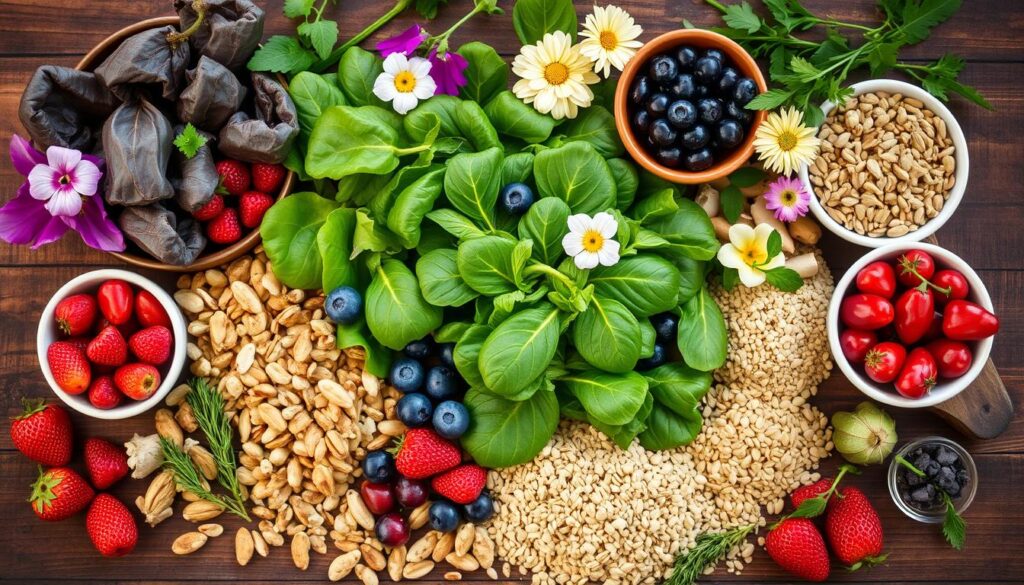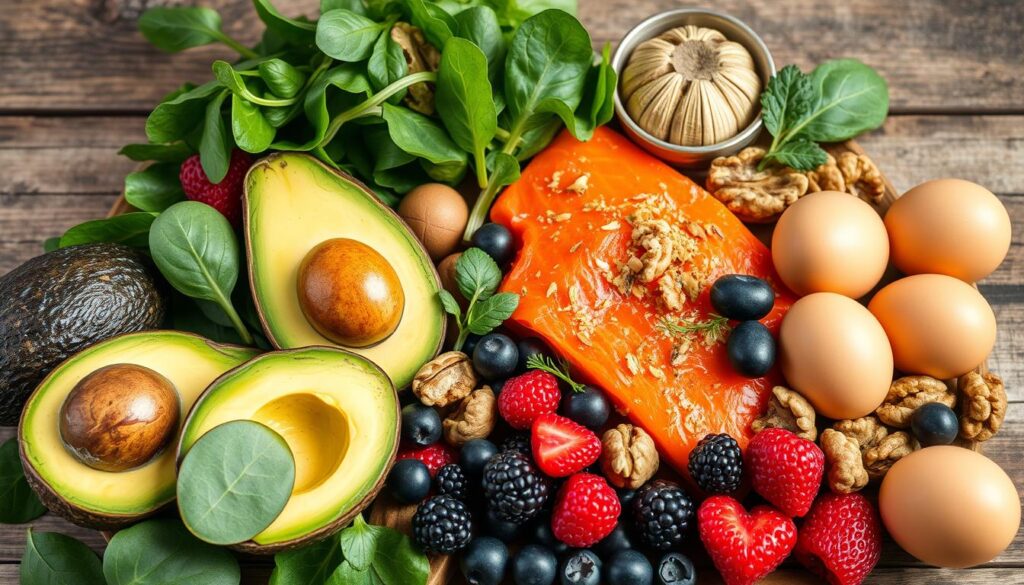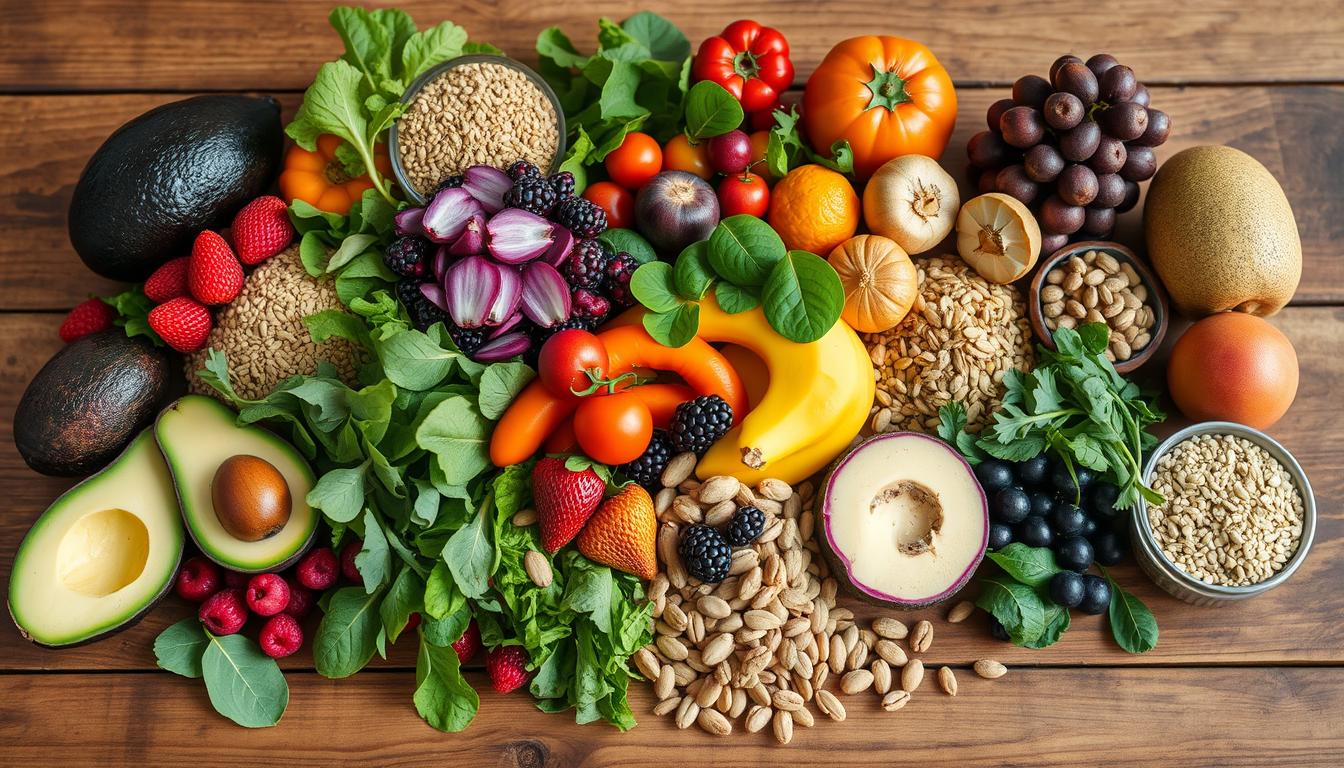Have you ever thought about how diet and fertility are linked? It’s a topic that shows how important food is for our reproductive health. I’m here to make it easy to understand. We’ll look at good foods and bad ones to help you conceive and stay healthy.
Did you know being too heavy or too thin can hurt your fertility? Women with a BMI of 30 or higher face a big risk. On the other hand, being underweight can lead to ovulation problems1. It’s also true that certain groups face even more challenges when trying to get pregnant1.
Ready to dive in? We’ll check out important foods and tips to boost your fertility. Let’s see how what you eat can really change things!
Key Takeaways
- Obesity and being underweight are linked to higher infertility risks1.
- Social determinants such as race, income, and education affect infertility rates significantly1.
- Incorporating a “fertility diet” can dramatically lower the risk of ovulatory disorders1.
- Consuming omega-3 fatty acids and full-fat dairy improve fertility outcomes1.
- Processed foods and red meats can negatively impact your chances of conception2.
The Role of Nutrition in Reproductive Health

Exploring reproductive nutrition shows how diet affects fertility and health. About 15% of couples worldwide struggle to get pregnant, with 35% of cases due to female issues3. Eating right for fertility helps the body work better.
Many things can cause female infertility, like ovulation problems and chronic diseases. A fertility diet is key, helping with conditions like endometriosis and ovulation issues3. It boosts chances of getting pregnant and keeping a healthy pregnancy.
The Mediterranean diet is great for fertility. It’s full of veggies, fruits, olive oil, and whole grains, but low in red meat and sugar. This diet has been linked to better fertility, thanks to its positive effects on ovulation3. Women with PCOS who eat like this see better insulin sensitivity and reproductive health4.
Research also shows that less carbs can help women with PCOS, by lowering inflammation and improving metabolism4. Tailoring nutrition to individual needs can greatly improve fertility and health. A diet full of antioxidants, healthy fats, and complex carbs supports reproductive health and boosts pregnancy chances.
In short, knowing and following a fertility diet is key for fertility and long-term health. It’s about making smart choices for a healthier, happier life.
Essential Nutrients for Women’s Reproductive Health

Getting the right nutrients is key for your reproductive health. Let’s look at three important ones: folic acid, iron, and omega-3 fatty acids.
Folic Acid
Folic acid is vital for conception. It helps make healthy red blood cells and prevents birth defects. Women should eat foods rich in folic acid when trying to conceive. Include leafy greens, legumes, and fortified cereals in your diet.
Iron
Iron is vital for pregnancy. It helps make hemoglobin, which carries oxygen to your baby. Most women don’t get enough iron, which can make conception hard5. Eat iron-rich foods like red meat, beans, and spinach. Pair these with vitamin C foods to better absorb iron.
Omega-3 Fatty Acids
Omega-3 fatty acids are great for reproductive health. They support brain and eye health and improve fertility. Find them in fish, chia seeds, and walnuts5. Most women don’t eat enough seafood, which is recommended weekly6. Adding more omega-3 foods to your diet can boost fertility and health.
Eating foods rich in folic acid, iron, and omega-3 fatty acids can improve your reproductive health. A balanced diet with these nutrients is good for your body and future pregnancies.
How Diet Affects Fertility
Knowing how diet impacts conception can help you choose better foods for fertility. Studies, like the Nurses’ Health Study, show how diet affects fertility. They used questionnaires from registered nurses7. Let’s explore how different nutrients and foods can help you conceive.
Experts say eating more whole grains can boost pregnancy and birth rates8. This shows the value of meals with low glycemic load foods. These foods help with insulin resistance and reproductive hormones7. Also, switching to whole foods, veggies, and fruits keeps blood sugar and hormones balanced, improving fertility7.
Eating more animal proteins can lead to ovulatory issues, but plant proteins are better. A diet with 5% energy from vegetable proteins can cut ovulatory disorder risk by over 50%8. This highlights the importance of choosing the right foods for fertility. Diets with less than 45% carbs can also help women with PCOS, improving fertility8.
It’s important to note that diets like the Mediterranean diet are good for fertility and heart health. They focus on plant-based foods, whole grains, and healthy fats. These diets reduce disease risks and improve reproductive health7. On the other hand, diets high in simple carbs increase ovulatory infertility risk7.
To wrap it up, good nutrition is key for conceiving. Eating nutrient-rich foods supports reproductive health and overall well-being. A smart diet can significantly impact your fertility journey.
Foods to Include for Better Reproductive Health
Changing your diet can greatly improve your reproductive health. Let’s look at the best foods to eat.
Leafy Greens
Leafy greens like spinach, kale, and Swiss chard are full of nutrients. They have iron, folic acid, and antioxidants. These are key for hormonal balance and reproductive health.
Eating these greens often can boost your chances of getting pregnant. They give your body the nutrients it needs.
Berries
Berries like strawberries, blueberries, and raspberries are packed with antioxidants. They also have vitamins C and E, important for reproductive health. Eating berries daily can improve your health and fertility by supporting egg and sperm quality.
Fish
Fish like salmon, mackerel, and sardines are good for reproductive health. They have omega-3 fatty acids that improve egg quality and reduce inflammation. This can help with ovulation and a healthy pregnancy9.
Eating fish at least twice a week can help your fertility journey.
Nuts
Nuts like almonds, walnuts, and sunflower seeds are full of protein, healthy fats, and vitamin E. These nutrients help with hormonal balance and reproductive health. Eating nuts daily can improve egg and sperm quality, boosting fertility9.
A study found that eating walnuts daily for three months increased active sperm10.
Whole Grains
Whole grains like quinoa, brown rice, and whole wheat bread give you energy and nutrients. They have B vitamins, iron, and selenium. These are important for hormonal balance, ovulation, and reproductive health.
In summary, adding these foods to your diet can greatly improve your reproductive health. By focusing on reproductive health through diet, you’re taking steps towards hormonal balance and conception.
Diet and Women’s Reproductive Health
It’s key to know how diet affects women’s health for better reproductive health. About 6% of married women of childbearing age face infertility. What they eat plays a big part in managing this issue11. Malnutrition can lead to delayed puberty and less ovulation, showing why a balanced diet is important for fertility12
Eating right can help with fertility by providing the needed nutrients. It’s good to avoid foods high in cholesterol like liver and egg yolks. Instead, choose lean meats and skinless poultry for a diet that supports fertility13. The “Fertility Diet” has been shown to lower the risk of ovulatory infertility by 66% and other infertility by 27%11.
Keeping a healthy weight is also key for fertility. Women with a BMI of 25 or higher may see better fertility with weight loss. Those with a BMI under 18.5 might have irregular periods or stop ovulating11. This shows how diet affects fertility, making it important to make dietary changes for those trying to conceive.
Here are some dietary tips to help with reproductive health:
- Eat more vegetable proteins from beans and tofu to boost fertility13.
- Have two servings a day of whole milk or whole milk products for fertility benefits13.
- Choose small fish like salmon or tilapia for safer eating13.
- Do regular exercise, aiming for 30 minutes a day, to improve fertility13.
It’s also important to watch out for processed foods. Foods high in fast carbs can lead to weight gain and insulin resistance. This can disrupt normal ovulation and worsen ovulation problems, which cause infertility in at least 30% of cases13. So, balancing your diet and making smart food choices can greatly impact your reproductive health.
Impact of Processed Foods on Fertility
It’s important to know how processed foods can harm your fertility. Infertility affects 20–30% of women of childbearing age worldwide14. Women who eat a lot of fast food and little fresh produce may take longer to get pregnant15. Drinking sugary drinks can also lower fertility for both men and women15.
Unhealthy diets can really impact getting pregnant. Foods like processed meats can hurt fertility15. But, eating more fruits and veggies can help increase fertility levels15. Stress, caffeine, and bad nutrition can also affect women’s reproductive health, though the science is not clear16.
Now, let’s look at how a healthy diet compares to an unhealthy one for fertility. The differences in reproductive health are quite striking:
| Diet Type | Impact on Fertility |
|---|---|
| Healthy Diet (High in fruits, vegetables, and plant-based proteins) | Higher levels of fertility; reduced ovulatory issues15. |
| Unhealthy Diet (High in fast foods, processed meats, and sugar-sweetened beverages) | Lower fertility rates; increased time to conceive; higher risk of ovulation-related issues15. |
To tackle the issue of processed foods and infertility, big changes in diet are needed. Women should make sure they get enough folic acid, iron, and vitamin B12 to counteract unhealthy diet effects16. By choosing better foods, you can improve your chances of reproductive health.
Importance of Maintaining a Healthy BMI
Keeping a healthy BMI is key for both men and women in reproductive health. The BMI and fertility link is strong, affecting many reproductive health areas. Let’s see why a healthy weight is so important for conception.
For Women
Women with obesity face a 78% higher risk of infertility. Those who are overweight have a 27% higher risk compared to women with a normal BMI of 18.5–2517. This shows how important BMI is for reproductive health.
Obesity can lower pregnancy and live birth rates for those trying fertility treatments. It often means using higher doses of gonadotropin, leading to lower embryo quality17. Lifestyle changes have helped, with 90% of women starting to ovulate naturally and 78% getting pregnant after 12 months17.
Pregnant women with obesity also have higher risks of gestational diabetes, preeclampsia, and cesarean delivery17.
For Men
Men with a healthy BMI also help with fertility. Obesity in men can harm sperm quality and quantity, affecting conception chances. A balanced BMI helps with hormone regulation, which is vital for reproductive health.
Both men and women should aim for a healthy weight for conception. Making lifestyle changes can help. By keeping a healthy BMI, you can boost your chances of conception and have a smoother pregnancy journey.
Supplements for Enhanced Fertility
When trying to get pregnant, adding fertility supplements to your routine is key. Prenatal vitamins are very important. Women who take prenatal vitamins a month before trying to conceive have better chances of getting pregnant and conceive faster than those who don’t18. Also, taking multivitamins or prenatal vitamins can help with ovulatory infertility, with the biggest benefits from folic acid intake over 400 mcg at least three times a week18.
Vitamins like B6 and B12 can also help. Vitamin B6 helps balance hormones, which can improve ovulation and conception chances. Vitamin B12 is linked to better semen quality in men18. Vitamin D also supports better pregnancy rates and semen quality in men, making the reproductive system healthier18.
Antioxidants like CoQ10 are beneficial for both men and women. It boosts sperm concentration and motility in men and increases pregnancy chances in women, even those over 4018. Omega-3 fatty acids are also great, improving egg and sperm quality, which is good for those over 3518. They also help with embryo implantation and reduce premature labor risks in women19.
Minerals like iron and selenium are also essential. Iron supplements can decrease the risk of ovulatory infertility in women18. Selenium is important for fertility and linked to better sperm quality and lower miscarriage risk1819. Zinc is also key, improving sperm quality, egg development, and supporting fertilization19.
Other supplements worth mentioning include N-acetyl-cysteine (NAC) and L-arginine. NAC reduces oxidative stress and improves egg and embryo quality in women and sperm quality in men18. L-arginine supports sperm production and motility in men, helps with erectile dysfunction, and improves uterine lining in women18. Myoinositol helps regulate menstrual cycles and hormonal balance, which is good for those with PCOS19.
| Supplement | Benefits for Women | Benefits for Men |
|---|---|---|
| Vitamin B6 | Improves hormonal balance and ovulatory cycles18 | – |
| Vitamin B12 | – | Enhances semen quality18 |
| Coenzyme Q10 | Improves ovarian response and pregnancy chances1819 | Increases sperm motility19 |
| Omega-3s | Supports egg quality and decreases premature labor1819 | Boosts sperm quality and motility19 |
| Iron | Reduces risk of ovulatory infertility18 | – |
| Selenium | Reduces miscarriage risk and improves egg quality18 | Enhances sperm quality19 |
| Zinc | Supports egg development19 | Improves sperm quality19 |
| N-acetyl-cysteine (NAC) | Reduces oxidative stress and improves embryo quality18 | Enhances sperm count and quality18 |
The Mediterranean Diet and Fertility
The Mediterranean diet is famous for its health perks, including better fertility and pregnancy results. It’s full of veggies, fruits, whole grains, fish, and healthy fats like olive oil. This makes it great for women wanting to boost their reproductive health.
Research shows great results for those on the Mediterranean diet. A review of 32 studies with 103,204 mostly White women found it lowers the risk of gestational diabetes mellitus and preterm birth20.
Randomized trials also found it reduces the risk of gestational hypertension and preeclampsia20. These findings show the diet’s benefits go beyond general health to improving pregnancy conditions.
A case-controlled study found that following the Mediterranean diet boosts fertility21. Omega-3s in fish and nuts help with hormone balance and fetal brain growth. Monounsaturated fats from olive oil and avocados improve insulin sensitivity and help with weight management21.
There’s a strong link between eating healthy for pregnancy and boosting fertility. Higher Mediterranean diet adherence is tied to better pregnancy outcomes. This includes fewer preterm births and better weight management during pregnancy20.
In conclusion, the Mediterranean diet is a top choice for improving reproductive health through diet. For women looking to enhance their fertility, this diet offers significant benefits and positive health changes.
Conclusion
Our exploration into how diet affects women’s reproductive health shows nutrition’s big impact. Foods like folic acid and omega-3 fatty acids are key. The Mediterranean diet also offers proven benefits for fertility and reproductive health.
Every meal matters. About 43% of women struggle with sexual issues like desire and satisfaction. Changing your diet can help a lot with these problems22. Eating well can also lower stress and improve mood22.
Women with PCOS can benefit from diets like DASH and Mediterranean. These diets help manage metabolic issues and boost fertility23. For overweight women with PCOS, diet and exercise are the first steps23.
Diet is critical for both men and women’s reproductive health. Switching to vegetable protein over animal protein can protect against ovulatory infertility24.
In short, the right diet can greatly improve fertility and reproductive health. Adding leafy greens or following a Mediterranean diet can help. Make smart food choices to enhance your reproductive health and overall well-being.
Source Links
- The Influence of Diet on Fertility and the Implications for Public Health Nutrition in the United States
- Diet and Fertility: A Review
- Female Fertility and the Nutritional Approach: The Most Essential Aspects
- How can diet influence women’s reproductive health?
- The Importance of Nutrition in Women’s Health | Gynecology and Obstetrics Medical Group
- Healthy eating and women | Office on Women’s Health
- Your diet and its effects on your fertility – Mayo Clinic Press
- How does nutrition affect female fertility?
- Best Practices To Improve Your Reproductive Health
- 6 foods that boost fertility
- Foods That Can Affect Fertility
- Frontiers | Nutrition and Female Fertility: An Interdependent Correlation
- Fertility Diet – Institute for Reproductive Health
- The Influence of Metabolic Factors and Diet on Fertility
- Does Nutrition Affect Fertility | UNC Fertility Clinic
- Association of western diet & lifestyle with decreased fertility
- Optimizing reproductive health in women with obesity and infertility
- The Best Vitamins and Supplements to Boost Your Fertility | Progyny
- Best Fertility Supplements | The Evewell London
- Mediterranean diet and female reproductive health over lifespan: a systematic review and meta-analysis – PubMed
- The Benefits of Eating a Mediterranean Diet for Fertility
- Dietary Approaches to Women’s Sexual and Reproductive Health
- Frontiers | Dietary Modification for Reproductive Health in Women With Polycystic Ovary Syndrome: A Systematic Review and Meta-Analysis
- Lifestyle factors and reproductive health: taking control of your fertility – Reproductive Biology and Endocrinology












No responses yet